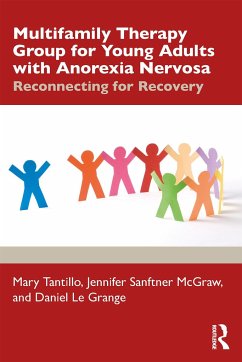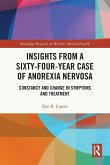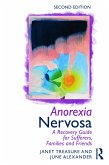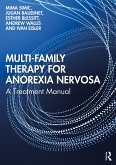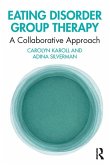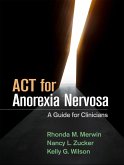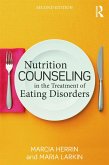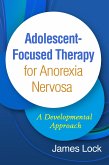Mary Tantillo, Jennifer L. Sanftner McGraw, Daniel Le Grange (Benioff UCSF Professor in Children's Health FAED
Multifamily Therapy Group for Young Adults with Anorexia Nervosa
Reconnecting for Recovery
Mary Tantillo, Jennifer L. Sanftner McGraw, Daniel Le Grange (Benioff UCSF Professor in Children's Health FAED
Multifamily Therapy Group for Young Adults with Anorexia Nervosa
Reconnecting for Recovery
- Broschiertes Buch
- Merkliste
- Auf die Merkliste
- Bewerten Bewerten
- Teilen
- Produkt teilen
- Produkterinnerung
- Produkterinnerung
Multifamily Therapy Group for Young Adults with Anorexia Nervosa describes a new and innovative family-centered outpatient Multifamily Therapy Group (MFTG) approach called Reconnecting for Recovery (R4R) for young adults with anorexia nervosa that is based on a relational reframing of eating disorders.
Andere Kunden interessierten sich auch für
![Insights from a Sixty-Four-Year Case of Anorexia Nervosa Insights from a Sixty-Four-Year Case of Anorexia Nervosa]() Don R. LipsittInsights from a Sixty-Four-Year Case of Anorexia Nervosa57,99 €
Don R. LipsittInsights from a Sixty-Four-Year Case of Anorexia Nervosa57,99 €![Anorexia Nervosa Anorexia Nervosa]() Janet TreasureAnorexia Nervosa29,99 €
Janet TreasureAnorexia Nervosa29,99 €![Multi-Family Therapy for Anorexia Nervosa Multi-Family Therapy for Anorexia Nervosa]() Mima SimicMulti-Family Therapy for Anorexia Nervosa37,99 €
Mima SimicMulti-Family Therapy for Anorexia Nervosa37,99 €![Eating Disorder Group Therapy Eating Disorder Group Therapy]() Carolyn KarollEating Disorder Group Therapy44,99 €
Carolyn KarollEating Disorder Group Therapy44,99 €![ACT for Anorexia Nervosa ACT for Anorexia Nervosa]() Rhonda M. Merwin (United States Duke University School of MedicineACT for Anorexia Nervosa55,99 €
Rhonda M. Merwin (United States Duke University School of MedicineACT for Anorexia Nervosa55,99 €![Nutrition Counseling in the Treatment of Eating Disorders Nutrition Counseling in the Treatment of Eating Disorders]() Marcia HerrinNutrition Counseling in the Treatment of Eating Disorders62,99 €
Marcia HerrinNutrition Counseling in the Treatment of Eating Disorders62,99 €![Adolescent-Focused Therapy for Anorexia Nervosa Adolescent-Focused Therapy for Anorexia Nervosa]() James Lock (United States Stanford University School of Medicine)Adolescent-Focused Therapy for Anorexia Nervosa52,99 €
James Lock (United States Stanford University School of Medicine)Adolescent-Focused Therapy for Anorexia Nervosa52,99 €-
-
-
Multifamily Therapy Group for Young Adults with Anorexia Nervosa describes a new and innovative family-centered outpatient Multifamily Therapy Group (MFTG) approach called Reconnecting for Recovery (R4R) for young adults with anorexia nervosa that is based on a relational reframing of eating disorders.
Hinweis: Dieser Artikel kann nur an eine deutsche Lieferadresse ausgeliefert werden.
Hinweis: Dieser Artikel kann nur an eine deutsche Lieferadresse ausgeliefert werden.
Produktdetails
- Produktdetails
- Verlag: Taylor & Francis Ltd
- Seitenzahl: 326
- Erscheinungstermin: 24. November 2020
- Englisch
- Abmessung: 229mm x 152mm x 18mm
- Gewicht: 474g
- ISBN-13: 9781138624900
- ISBN-10: 113862490X
- Artikelnr.: 58565560
- Herstellerkennzeichnung
- Libri GmbH
- Europaallee 1
- 36244 Bad Hersfeld
- gpsr@libri.de
- Verlag: Taylor & Francis Ltd
- Seitenzahl: 326
- Erscheinungstermin: 24. November 2020
- Englisch
- Abmessung: 229mm x 152mm x 18mm
- Gewicht: 474g
- ISBN-13: 9781138624900
- ISBN-10: 113862490X
- Artikelnr.: 58565560
- Herstellerkennzeichnung
- Libri GmbH
- Europaallee 1
- 36244 Bad Hersfeld
- gpsr@libri.de
Mary Tantillo, PhD, PMHCNS-BC, CGP, FAED, is professor of clinical nursing at University of Rochester School of Nursing, director of the Western New York Comprehensive Care Center for Eating Disorders, and founder of The Healing Connection Inc. Jennifer Sanftner McGraw, PhD, is professor of psychology and department chair at Slippery Rock University and founder and director of the Slippery Rock chapter of the Reflections Body Image Program. Daniel Le Grange, PhD, holds a distinguished professorship in the department of psychiatry at the University of California, San Francisco and is director of the eating disorders program in the Division of Child and Adolescent Psychiatry. Santo Caruana, Artist and young adult in recovery from an eating disorder. Marie Bieber RD, CSP, CDN, Registered dietitian specializing in eating disorders in private practice and on the Western New York Comprehensive Care Center for Eating Disorders Project ECHO TM team.
Chapter 1: Reconnecting for Recovery (R4R): A Relational/Motivational
Multifamily Therapy Group for Young Adults with Anorexia Nervosa; Chapter
2: The Promise of Multifamily Therapy Group for Young Adults with Anorexia
Nervosa; Chapter 3: Development of the Reconnecting for Recovery (R4R) MFTG
approach and this Manual; Chapter 4: Getting Ready: Group Structure,
Co-Facilitation, Recruitment, and Initial Phone Screening; Chapter 5:
Session 1: Engaging and Evaluating Young Adults with Anorexia Nervosa and
Their Families: Assessment, Joining and Orientation; Chapter 6: Session 2:
Engaging and Evaluating Young Adults with Anorexia Nervosa and Their
Families: Assessment, Joining and Orientation (continued);Chapter 7:
Session 3: Anorexia Nervosa: A Disease of Disconnection - Introduction,
recovery process, motivational interviewing principles, and the spiral of
change; Chapter 8: Session 4: Anorexia Nervosa: A Disease of Disconnection
- Introduction, recovery process, motivational interviewing principles, and
the spiral of change (continued); Chapter 9: Session 5: Biopsychosocial
Factors for Anorexia Nervosa & Co-morbidity; Chapter 10: Session 6:
Biopsychosocial Factors (continued), Disconnection and Functional Analysis
Skills; Chapter 11: Session 7: Strategies to Promote Mutual Connection;
Chapter 12: Session 8: Anorexia Nervosa and the Family Context: Rules and
Relationships; Chapter 13: Session 9: Identifying Points of Tension and
Disconnections Related to Anorexia Nervosa, Recovery and Relationships;
Chapter 14: Session 10: Nourishing and Empowering the "We" in
Relationships; Chapter 15: Session 11: Waging Good Conflict in Connection;
Chapter 16: Session 12: Moving from Disconnection to Connection: Building
Strong Connections to Work through Tension and Disconnections Related to
Adulthood and Recovery; Chapter 17: Session 13: Relapse Prevention and
Maintaining Good Connection; Chapter 18: Session 14: Relapse Prevention
(Continued) and Preparing for Termination; Chapter 19: Session 15: Relapse
Prevention (Continued), Termination, and Next Steps for Continued
Connections in Recovery; Chapter 20: Session 16: Relapse Prevention
(Continued), Termination, and Next Steps for Continued Connections in
Recovery; Chapter 21: What is Next? Training, Dissemination, Clinical
Practice and Research
Multifamily Therapy Group for Young Adults with Anorexia Nervosa; Chapter
2: The Promise of Multifamily Therapy Group for Young Adults with Anorexia
Nervosa; Chapter 3: Development of the Reconnecting for Recovery (R4R) MFTG
approach and this Manual; Chapter 4: Getting Ready: Group Structure,
Co-Facilitation, Recruitment, and Initial Phone Screening; Chapter 5:
Session 1: Engaging and Evaluating Young Adults with Anorexia Nervosa and
Their Families: Assessment, Joining and Orientation; Chapter 6: Session 2:
Engaging and Evaluating Young Adults with Anorexia Nervosa and Their
Families: Assessment, Joining and Orientation (continued);Chapter 7:
Session 3: Anorexia Nervosa: A Disease of Disconnection - Introduction,
recovery process, motivational interviewing principles, and the spiral of
change; Chapter 8: Session 4: Anorexia Nervosa: A Disease of Disconnection
- Introduction, recovery process, motivational interviewing principles, and
the spiral of change (continued); Chapter 9: Session 5: Biopsychosocial
Factors for Anorexia Nervosa & Co-morbidity; Chapter 10: Session 6:
Biopsychosocial Factors (continued), Disconnection and Functional Analysis
Skills; Chapter 11: Session 7: Strategies to Promote Mutual Connection;
Chapter 12: Session 8: Anorexia Nervosa and the Family Context: Rules and
Relationships; Chapter 13: Session 9: Identifying Points of Tension and
Disconnections Related to Anorexia Nervosa, Recovery and Relationships;
Chapter 14: Session 10: Nourishing and Empowering the "We" in
Relationships; Chapter 15: Session 11: Waging Good Conflict in Connection;
Chapter 16: Session 12: Moving from Disconnection to Connection: Building
Strong Connections to Work through Tension and Disconnections Related to
Adulthood and Recovery; Chapter 17: Session 13: Relapse Prevention and
Maintaining Good Connection; Chapter 18: Session 14: Relapse Prevention
(Continued) and Preparing for Termination; Chapter 19: Session 15: Relapse
Prevention (Continued), Termination, and Next Steps for Continued
Connections in Recovery; Chapter 20: Session 16: Relapse Prevention
(Continued), Termination, and Next Steps for Continued Connections in
Recovery; Chapter 21: What is Next? Training, Dissemination, Clinical
Practice and Research
Chapter 1: Reconnecting for Recovery (R4R): A Relational/Motivational
Multifamily Therapy Group for Young Adults with Anorexia Nervosa; Chapter
2: The Promise of Multifamily Therapy Group for Young Adults with Anorexia
Nervosa; Chapter 3: Development of the Reconnecting for Recovery (R4R) MFTG
approach and this Manual; Chapter 4: Getting Ready: Group Structure,
Co-Facilitation, Recruitment, and Initial Phone Screening; Chapter 5:
Session 1: Engaging and Evaluating Young Adults with Anorexia Nervosa and
Their Families: Assessment, Joining and Orientation; Chapter 6: Session 2:
Engaging and Evaluating Young Adults with Anorexia Nervosa and Their
Families: Assessment, Joining and Orientation (continued);Chapter 7:
Session 3: Anorexia Nervosa: A Disease of Disconnection - Introduction,
recovery process, motivational interviewing principles, and the spiral of
change; Chapter 8: Session 4: Anorexia Nervosa: A Disease of Disconnection
- Introduction, recovery process, motivational interviewing principles, and
the spiral of change (continued); Chapter 9: Session 5: Biopsychosocial
Factors for Anorexia Nervosa & Co-morbidity; Chapter 10: Session 6:
Biopsychosocial Factors (continued), Disconnection and Functional Analysis
Skills; Chapter 11: Session 7: Strategies to Promote Mutual Connection;
Chapter 12: Session 8: Anorexia Nervosa and the Family Context: Rules and
Relationships; Chapter 13: Session 9: Identifying Points of Tension and
Disconnections Related to Anorexia Nervosa, Recovery and Relationships;
Chapter 14: Session 10: Nourishing and Empowering the "We" in
Relationships; Chapter 15: Session 11: Waging Good Conflict in Connection;
Chapter 16: Session 12: Moving from Disconnection to Connection: Building
Strong Connections to Work through Tension and Disconnections Related to
Adulthood and Recovery; Chapter 17: Session 13: Relapse Prevention and
Maintaining Good Connection; Chapter 18: Session 14: Relapse Prevention
(Continued) and Preparing for Termination; Chapter 19: Session 15: Relapse
Prevention (Continued), Termination, and Next Steps for Continued
Connections in Recovery; Chapter 20: Session 16: Relapse Prevention
(Continued), Termination, and Next Steps for Continued Connections in
Recovery; Chapter 21: What is Next? Training, Dissemination, Clinical
Practice and Research
Multifamily Therapy Group for Young Adults with Anorexia Nervosa; Chapter
2: The Promise of Multifamily Therapy Group for Young Adults with Anorexia
Nervosa; Chapter 3: Development of the Reconnecting for Recovery (R4R) MFTG
approach and this Manual; Chapter 4: Getting Ready: Group Structure,
Co-Facilitation, Recruitment, and Initial Phone Screening; Chapter 5:
Session 1: Engaging and Evaluating Young Adults with Anorexia Nervosa and
Their Families: Assessment, Joining and Orientation; Chapter 6: Session 2:
Engaging and Evaluating Young Adults with Anorexia Nervosa and Their
Families: Assessment, Joining and Orientation (continued);Chapter 7:
Session 3: Anorexia Nervosa: A Disease of Disconnection - Introduction,
recovery process, motivational interviewing principles, and the spiral of
change; Chapter 8: Session 4: Anorexia Nervosa: A Disease of Disconnection
- Introduction, recovery process, motivational interviewing principles, and
the spiral of change (continued); Chapter 9: Session 5: Biopsychosocial
Factors for Anorexia Nervosa & Co-morbidity; Chapter 10: Session 6:
Biopsychosocial Factors (continued), Disconnection and Functional Analysis
Skills; Chapter 11: Session 7: Strategies to Promote Mutual Connection;
Chapter 12: Session 8: Anorexia Nervosa and the Family Context: Rules and
Relationships; Chapter 13: Session 9: Identifying Points of Tension and
Disconnections Related to Anorexia Nervosa, Recovery and Relationships;
Chapter 14: Session 10: Nourishing and Empowering the "We" in
Relationships; Chapter 15: Session 11: Waging Good Conflict in Connection;
Chapter 16: Session 12: Moving from Disconnection to Connection: Building
Strong Connections to Work through Tension and Disconnections Related to
Adulthood and Recovery; Chapter 17: Session 13: Relapse Prevention and
Maintaining Good Connection; Chapter 18: Session 14: Relapse Prevention
(Continued) and Preparing for Termination; Chapter 19: Session 15: Relapse
Prevention (Continued), Termination, and Next Steps for Continued
Connections in Recovery; Chapter 20: Session 16: Relapse Prevention
(Continued), Termination, and Next Steps for Continued Connections in
Recovery; Chapter 21: What is Next? Training, Dissemination, Clinical
Practice and Research

